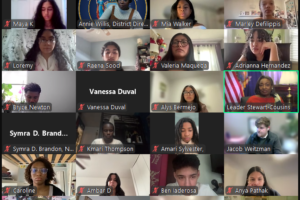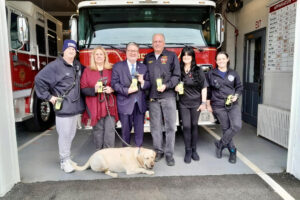Governor Kathy Hochul signed legislation to expand New York’s food donation and food scraps recycling program, which provides high-quality food to low-income New Yorkers. Since launching in 2022, food waste generators have successfully diverted tens of millions of pounds of food to those in need.
“No one in New York should be forced to choose between paying rent or putting food on the table,” Governor Hochul said. “Expanding the State’s Food Donation and Food Scraps Recycling Law will expand access to food supplies and make sure families in need have the resources they deserve.”
Legislation S.5331-A/A.5906-A will promote the collection of more excess edible food and send more food scraps for recycling—including composting and anaerobic digestion—by gradually increasing the number of businesses and institutions required to donate excess edible food and recycle food scraps if they are within 50 miles (increased from the prior law’s 25 miles) of an organics recycler.
With funding from DEC, Feeding New York State—the state association of New York’s 10 Feeding America member food banks—has been able to increase new food donations, reporting an average of two million pounds of food donations each month. The program reached a record 32 million pounds of food since launching in 2022.
DEC Interim Commissioner Sean Mahar said, “New York’s Food Donation and Food Scraps Recycling Law has been an outstanding success in our efforts to feed hungry New York families and reduce greenhouse gases created by landfilling wasted food. Expansion of the law will accelerate the program’s growth to bring more food to New Yorkers in need while strengthening our work to implement the Climate Leadership and Community Protection Act. We thank Governor Hochul for her support of this vital program and look forward to working with our state agency partners and Feeding New York State to support the 10-member food banks across the state.”
State Senator Pete Harckham said, “So many people in communities statewide still face food insecurity, which is why we cannot let up our fight against hunger. The success of the food donation law has been truly remarkable, and by expanding this law we address sustainability and climate accountability as well the need to lessen waste in our landfills. I appreciate the partnership of Assemblymember Shimsky on this legislation and thank Governor Hochul for signing it into law. Most of all, I thank the many volunteers who are fighting hunger in New York.”
Assemblymember MaryJane Shimsky said,“With today’s action by Governor Hochul, New York is on the path to having a sustainable, statewide food scrap recycling program by 2028. It is a necessary next step, given that an estimated thirty-five to forty percent of food enters the waste stream — contributing to nearly a third of our greenhouse gas emissions. With implementation phasing in over the next three years, it will give our businesses and recycling infrastructure the time they need to build capacity. I thank the Governor and Senator Harckham for their partnership in getting this legislation accomplished.”
New York League of Conservation Voters Policy Director Pat McClellan said, “Sending millions of tons of food to landfills – where it decomposes and releases methane, a potent greenhouse gas – not only wastes valuable resources and contributes to climate change, it’s also a missed opportunity to feed vulnerable New Yorkers who face food insecurity. New York’s food donation and food scraps recycling program has proven to be a great success, and we applaud Governor Hochul for signing the expansion into law and thank Senator Pete Harckham and Assemblymember MaryJane Shimsky for their tireless support for this NYLCV Scorecard bill.”
Feeding New York State Executive Director Jay Hawkins said, “New York State’s Food Donation and Food Scraps Recycling law has enabled New York’s food bank and their partner agencies to provide 37 million pounds of healthy food to food-insecure New Yorkers—perfectly good food that would have otherwise ended up in landfills. The expansion of this law, alongside the continued support from Governor Hochul, Commissioner Mahar, and the NYSDEC team, will empower us to grow our nation’s leading Food Recovery Program and make significant strides toward a hunger-free New York.”
New York State’s Climate Agenda
New York State’s climate agenda calls for an affordable and just transition to a clean energy economy that creates family-sustaining jobs, promotes economic growth through green investments, and directs a minimum of 35 percent of the benefits to disadvantaged communities. New York is advancing a suite of efforts to achieve an emissions-free economy by 2050, including in the energy, buildings, transportation, and waste sectors.






